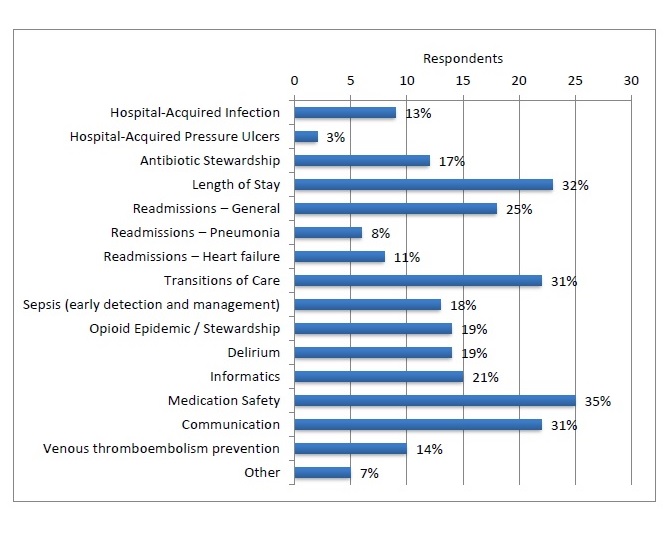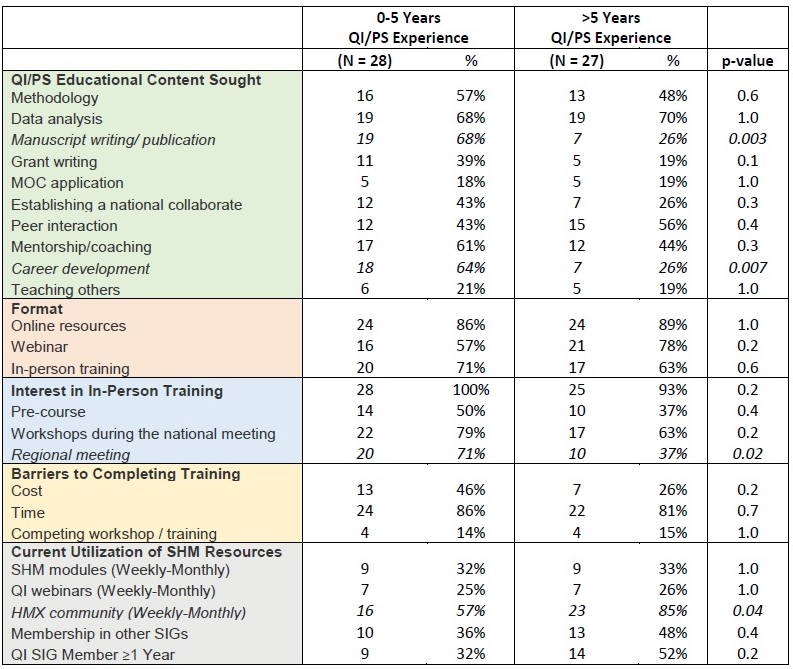Background: The Society of Hospital Medicine (SHM) is the academic professional home for more than 16,000 hospitalists around the world [1]. The SHM Quality Improvement (QI) Special Interest Group (SIG), which currently has 813 members including residents and medical students, known as QI enthusiasts, uses an online platform, Hospital Medicine Exchange (HMX), to share project ideas, receive help to overcome barriers, spread QI/Patient Safety (PS) resources, hone QI skills, and interact with colleagues throughout the hospitalist QI/PS community. We performed a survey of members of the SHM HMX community to identify and describe the educational needs and preferences of QI enthusiasts. We further aimed to compare the educational needs of early career QI enthusiasts with those with more experience.
Methods: The SHM QI SIG Initiatives subgroup created an 18-item survey in a web-based platform licensed through SHM and distributed it to members of SHM QI SIG and the SHM Open Forum via a post on the HMX platform to elicit information about members’ current involvement and experience in QI/PS and the types of resources and training that they seek. The project received an exemption from the Montefiore Health System Institutional Review Board. Reminders were sent 2 and 4 weeks after the initial post. We compared the educational needs of early career QI/PS enthusiasts (5 years or less of QI/PS experience) and those of more experienced QI/PS enthusiasts (more than 5 years of QI/PS) using Fisher’s Exact Test.
Results: A total of 72 SHM HMX members responded to the survey. Respondents expressed an interest in a variety of topics, with the most frequent educational needs being medication safety (35%), length of stay (32%), transitions of care (31%), communication (31%), and readmissions (25%) (Figure 1).Among the respondents, 39% (28) reported having 0-5 years of experience in QI/PS and 37% (27) reported having more than 5 years of experience; 24% (17) did not answer the question regarding their years of QI/PS experience and were excluded from this analysis. Early career QI enthusiasts sought more support with manuscript writing and publication (68% vs 26%, p=0.003) and career development (64% vs 26%, p = 0.007) than their more experienced counterparts; they were also more interested in receiving training at regional meetings (71% vs. 37%, p=0.02) and were less likely to utilize the HMX community on a weekly to monthly basis (57% vs. 85%, p=0.04). Both groups expressed a substantial need for educational content on data analysis, a preference for online resources, and an interest in in-person training. Time was the most common barrier to completing QI/PS training. Cost was more of a barrier for those with less QI/PS experience, but the difference was not statistically significant (46% vs. 26%, p=0.2) (Figure 2).
Conclusions: QI/PS enthusiasts at all stages of their career pursue a variety of educational opportunities to develop their QI/PS expertise. Early career QI enthusiasts, in our sample population are more likely to seek support in manuscript writing/publication and career development, are more interested in receiving training at regional meetings, and were less frequent utilizers of the HMX community. Knowledge of target areas of interest by experience will help guide the SHM QI SIG in developing new educational resources and innovative ways to deliver this content. Hospitalist leaders may also benefit as they mentor members of their hospital medicine groups.


